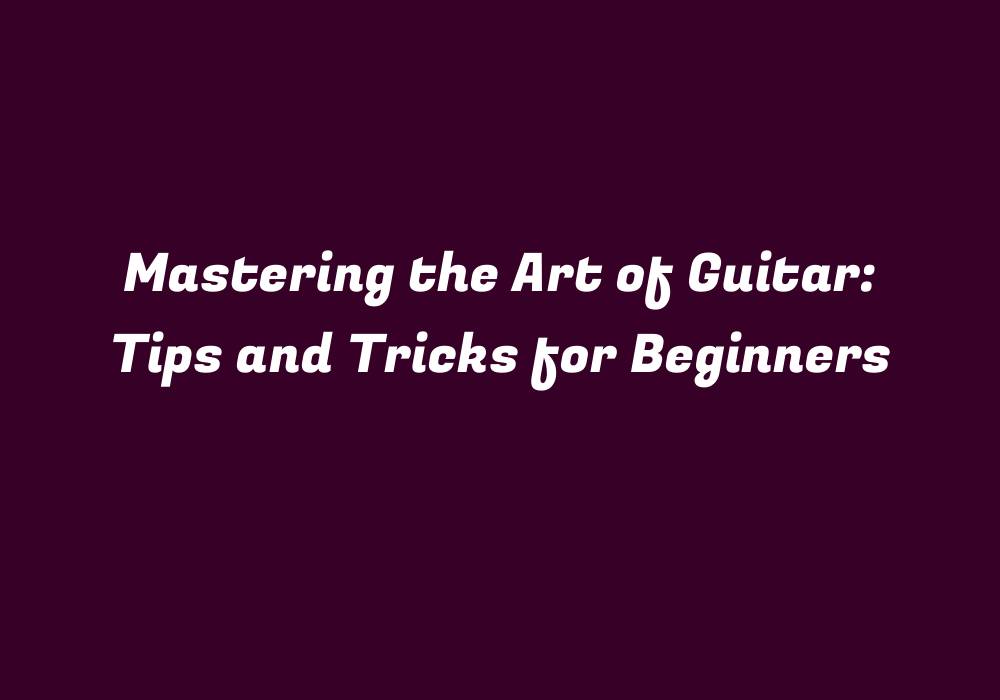Introduction: Beginning Your Guitar Journey
Learning to play the guitar is an amazing experience. It not only allows you to express your creativity but also enables a connection with music in a different way. As a beginner, it can be daunting trying to navigate through various techniques and methods of playing, which is why we have compiled some useful tips to help you master this captivating instrument.
Understand the Basics
To start your guitar journey on the right foot, one must first grasp the basic concepts such as guitar parts, strings, and chords. Learning these elements will provide a solid foundation that you can build upon for the rest of your musical journey. This includes familiarizing yourself with guitar anatomy, tuning your instrument, and getting acquainted with the different string notes.
Learn the Fundamentals
Before delving into complex techniques, master the essentials of playing guitar. Focus on learning basic chords and strumming patterns, as these are fundamental skills that will help you play a variety of songs. Practicing finger exercises can also significantly improve your finger dexterity and hand coordination which is vital for guitar playing.
Be Patient
Learning the guitar takes time, and it’s crucial to remember that progress won’t happen overnight. Set small goals for yourself and be consistent with your practice sessions. As you become more proficient in one aspect, move on to another skill or technique, ensuring a well-rounded approach to mastering your instrument.
Invest in the Right Equipment
Having the right tools is essential when learning guitar. While you don’t necessarily need an expensive guitar, it’s vital to choose one that feels comfortable for your hands and is in good condition. A quality beginner-friendly acoustic or electric guitar will serve as a solid starting point. Purchase a guitar tuner to ensure proper tuning and avoid any frustrations with the pitch of your instrument.
Practice, Practice, and Then Practice More
Like any skill, playing the guitar requires regular practice. Consistency is key to making significant progress and improving your playing abilities. Set aside time each day for your guitar practice sessions and dedicate that time solely to your instrument, without distractions. Breaking down practice into smaller, manageable segments can also help you focus on specific areas of improvement rather than feeling overwhelmed by the entire process.
Learn from Others
One of the best ways to improve is by learning from others who have a wealth of experience and knowledge in guitar playing. Engage with online forums, join local music communities, or take lessons from an experienced teacher. By interacting with other musicians, you can receive valuable insights and gain inspiration while developing your own unique style.
Embrace Technology
Today’s technology offers numerous resources to help improve your guitar playing skills. Utilize online tutorials, video lessons, or apps like Guitar Tricks or Jamplay to learn various techniques and get step-by-step guidance on improving your playing. These platforms provide an interactive and engaging way to enhance your knowledge of the instrument, without the need for expensive private lessons.
Create Your Own Rhythm
As you progress, learning how to play guitar involves more than just mastering chords and scales. Developing rhythm and timing is essential for creating a captivating performance. Practice various rhythms on your own and work with a metronome or drum beats to improve your sense of time and groove. This will significantly enhance your overall musicianship and allow you to express yourself musically in new ways.
Perform and Share Your Talent
As you grow more confident in your guitar skills, don’t shy away from sharing your music with others. Playing in front of a live audience will give you valuable experience and help build your performance skills. Join open mic nights, form a band, or share your creations online to expose yourself to new opportunities and develop as a musician.
Conclusion
Mastering the art of guitar playing is an incredible journey that requires dedication, patience, and the willingness to continuously learn. Embrace the challenges and joys this instrument has to offer, and soon enough you’ll find yourself unlocking your full potential as a guitarist. Remember, every note, chord, and strum counts in your quest to become a master of the guitar.
